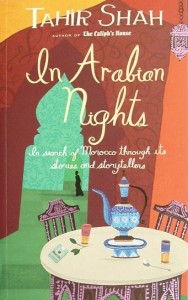Some time ago I reviewed The Last Storytellers by Richard Hamilton, a book that collects some of the tales of the last storytellers of Marrakech. Also the book about which I am writing today dives deep into the world of Moroccan storytellers.
Tahir Shah, the author of In Arabian Nights, is well equipped to undertake this journey into the heart of Morocco through its stories and storytellers. He has roots in the Orient (his family comes originally from Afghanistan), but he lived most of his life in the West (he grew up in Britain). He comes from a dynasty of storytellers himself: his father Idries Shah collected and published many books with traditional oriental tales and stories that contain a lot of the wisdom of the Sufi dervishes. Also the author’s aunt, Amina Shah, to whom the book is dedicated, was a collector and master storyteller of Arabic and Oriental stories and tales.
The probably best-known book by Tahir Shah is The Caliph’s House in which he describes how he settled in Casablanca with his family and bought an old house there. In Arabian Nights describes what happened after this period covered by the previous book.
It starts with a deeply disturbing and traumatic experience. When the author is preparing a documentary film he wants to make in Afghanistan, he is arrested by Pakistani police as a terror suspect and has to endure a several week long ordeal in one of the many Pakistani torture prisons, before he is finally released. What sustained him during these weeks were the stories told to him by his father when he was a child in Morocco and that he tried to recollect and repeat to himself.
After his return, the author starts to search for “his” story – based on an old Berber belief that each person has his/her own story, a story that has a special meaning for this person, and that you are only a complete person after you found that story.
Tahir Shah takes us readers on this journey which is full of interesting, frequently funny encounters and events. We meet storytellers in the most improbable disguise: from the craftsmen and guardians of the Caliph’s House, to the regular guests of Cafe Mabrook, a men-only coffee shop and hideout for henpecked husbands who hide here from their Alpha females at home; from the cobbler who repairs the author’s shoes, to Monsieur Benito, an old Italian gentleman who owns a copy of the rare first edition of Richard Burton’s Arabian Nights; from Mohamed Mrabet, the famous Moroccan storyteller, to a guardian in a mental hospital; from a Tuareg guide to Sufi masters: we get to know a great richness of stories – stories that are never only meant to entertain people but that have usually many layers below the surface, and the deeper the layer we reach, the deeper the meaning of the story. The author is taking us to the Atlas mountain and to Chefchaouen, to the Sahara desert and of course to Marrakech, the capital of storytellers, and to Fès, the dark heart of Morocco.
This book is not only a book about storytelling. It is also a travel book of course. But it is also a book about friendship and the high value it has in the traditional Moroccan society. When Dr Mehdi, a retired surgeon and one of the regulars in Cafe Mabrook with whom Shah makes friends, is asking the author for a favor, Shah agrees to do him this favor without asking (that’s a big difference to the Western world where everybody would first ask about what kind of favor it is – thus diminishing the friendship in the eyes of a Moroccan). Dr Mehdi is asking him to bring him some special salt from the Sahara desert that is needed for a wedding. It will be a journey that will have a deep impact on the author. And the journey has a surprising end that is also a lesson in friendship:
‘Is there enough salt for the wedding?’ – The surgeon took a deep breath. ‘There is no wedding,’ he said. – ‘What?’ – ‘The favor I asked you was less a favor to me and more a favor to yourself.’ – ‘I don’t understand.’ – ‘Think of the things you have seen, the people you have met and the stories you have heard,’ he said, emptying the bag of salt on to the path. ‘You are a different man than you were seven days ago.’
Another thing I really like about the book is the author’s attitude to Moroccans in general and to the poor people in particular. He is always truly respectful and willing to learn from them and to understand their way of thinking. The bidonville, the shantytown that borders the Caliph’s House, may be a mess. But good people are living there with their hearts in the right place.
This is one of the most delightful books I have been reading since a long time. But be careful, dear reader, this book might ignite a life-long passion for Morocco in you. After reading this book, you will almost for sure think about your (next) journey to this country that is so full of wonderful stories. Tahir Shah is opening our eyes, ears and hearts for these stories and for Morocco.
Tahir Shah: In Arabian Nights, Doubleday 2008
© Thomas Hübner and mytwostotinki.com, 2014. Unauthorized use and/or duplication of this material without expressed and written permission from this blog’s author and/or owner is strictly prohibited. Excerpts and links may be used, provided that full and clear credit is given to Thomas Hübner and mytwostotinki.com with appropriate and specific direction to the original content.




 Facebook
Facebook RSS
RSS Twitter
Twitter